#advice on self-publishing
Explore tagged Tumblr posts
Text
Not a fast writer? You can still build a successful publishing strategy - guest spot at @IndieAuthorAlli
The classic advice for authors, particularly indie authors, is to pump out a lot of books fast to build a big backlist and keep your readers interested. But that pace of writing and production doesn’t suit everybody. Exhibit A, the introduction to my newsletter. For a long time, slow-burn authors in the indie world weren’t getting seen or acknowledged. Most of the guidance was geared to fast…

View On WordPress
#advice on self-publishing#Alliance of Independent Authors#attitudes to self-publishing#beginner&039;s guide to self-publishing#how do literary authors build a brand#indie publishing schedule#literary fiction#self-publishing#slow writers#writing slowly
1 note
·
View note
Note
Hi, I was wondering which is better: Self-publishing or going through an actual publishing company like penguin house, etc. For some context, I've been set on self-publishing on kdp, mostly because I don't want a company to turn down my manuscript that I worked so very hard on AND think is very good writing. I also don't want to be the "Face of the book" if you will, and I am currently using a pen name. I want to get the best value out of my book, so I kinda want to do this right. Advice?
Well, I can't really answer which is "better" because that depends entirely on your ultimate goal. So, let me break down the advantages and disadvantages of both self-publishing and traditional publishing and you can see which sings to you.
Self-publishing is a good way to go if you want complete control over the process — editing, cover design, marketing. This works well if your ultimate goal is simply to have a printed book (or e-book) untouched by anyone but you.
It is not a good way to go, however, if you hope to make any money or have a new career. While all of us can point to the handful of authors who've made tons of money self-publishing (Andy Weir, for example), they are the exception, not the rule, and they all spent years building an audience online before they had their success story.
Also, as a self-published author, you are your own communications team, marketing team, PR team, etc. You basically have to take on multiple extra full-time jobs for no pay. [In that way, I guess you do get a new career(s).]
Traditional publishing comes with communications, marketing, design and, most important, editing baked in. And it comes with an advance, so out of the gate there's money. (Note: You do have to pay back the advance, but it comes out of your sales, not your pocket.) Plus, they have their own distribution channels set up. All you really have to do is write, do some self-promotion on social media, and get on the phone for the occasional press interview.
The obvious downside with traditional publishing is breaking in. It is a long process of putting yourself out there for a series of rejections and there's no guarantee you'll ever actually break in. To do so takes a magic blend of talent, persistence, timing, and luck.
If you want to avoid getting turned down by a company, it sounds like your choice is already made. However, I would strongly urge you to send your book out to publishers and agents anyway. If you get rejected, ask why. If you disagree with their reason, fine, move on to the next one. If you can see their point, however, consider it a note that can improve your book.
I love that self-publishing exists and it is a fantastic way for authors to get their work out into the world. But, personally, I prefer trad publishing. It allows me to focus almost solely on the writing. And I wholeheartedly believe that a good editor makes a writer's work better.
155 notes
·
View notes
Text
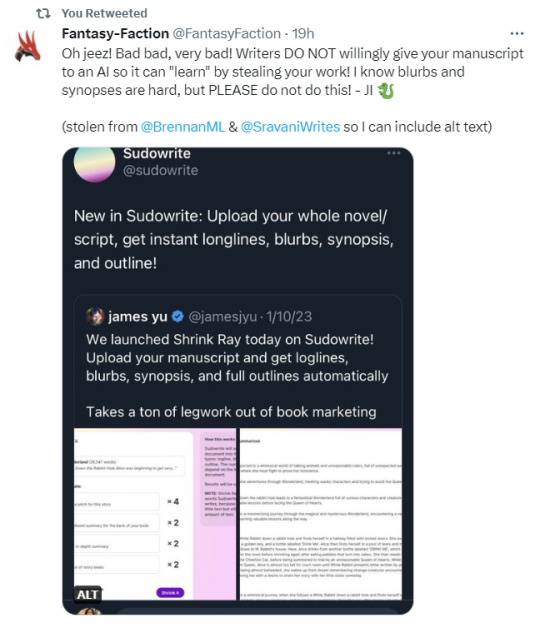
GUYS DO NOT GIVE YOUR MANUSCRIPT TO AN AI THIS IS A BAD IDEA ON EVERY LEVEL DON'T DO IT
original tweet from @jamesjyu reads: "We launch Shrink Ray today on Sudowrite! Upload your manuscript and get loglines, blurbs, synopsis, and full outlines automatically. Takes a ton of legwork out of book marketing. Below the tweet are two images of the program."
original quote tweet from @sudowrite reads: "New in Sudowrite: Upload your whole novel/script, get instant longlines (sic), blurbs, synopsis, and outline!"
tweet from @FantasyFaction reads: "Oh jeez! Bad bad, very bad! Writers DO NOT willingly give your manuscript to an AI so it can "learn" by stealing your work! I know blurbs and synopses are hard, but PLEASE do not do this! - JI 🐉
(stolen from ML Brennan & Sravani Hotha so I can include alt text)"
#ai writing#ai theft#ai generated#writing advice#writers block#fantasy-faction#fantasy#fantasy books#reading#booklr#books and libraries#bookblr#book blog#self publishing#self published#author life#fanfic writing#fanfiction#writing#writers#writers on tumblr#writer community#writer challenge#female writers#writer problems#writblr
3K notes
·
View notes
Note
May I ask the software you use to write?
Congratulations on getting so much done!
Thank you so much. And, of course.
I use the Reedsy Book Editor for all of my writing projects, and I've been using it for about three years now. I also have experience with other amazing softwares, and I would love to create more tutorials on them if you need me to.
Here's a quick tutorial on how to use the Reedsy Book Editor.
When you visit the website, the first thing you'll come across is this page. It's a completely free writing tool with a fantastic interface. All you need to do is sign up with your Google or Facebook account.
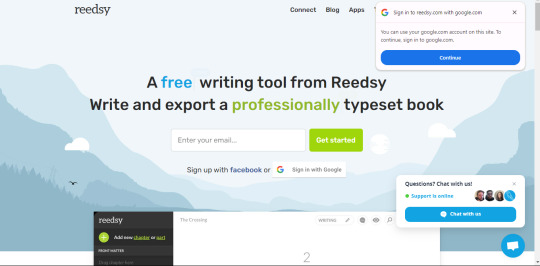
After you've completed the sign-up process and provided some information about yourself, you will be directed to this page. Please locate the "Books" option in the website's header.
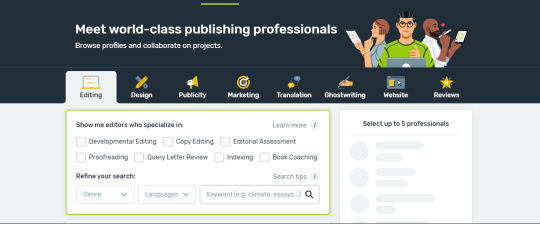
Feel free to give your book/WIP (Work in progress) a title. Remember, it's okay if it's not your final title, as you can always change it in the settings of your book later.
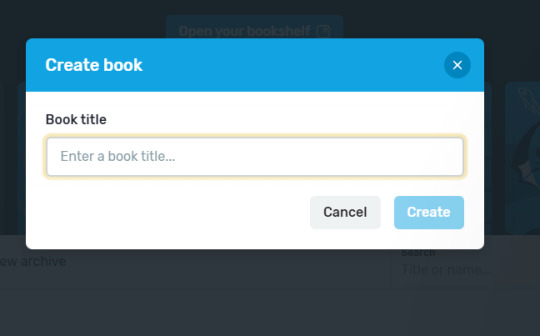
Once you've created it, you can take your time and when you're ready, you can click "Write.”
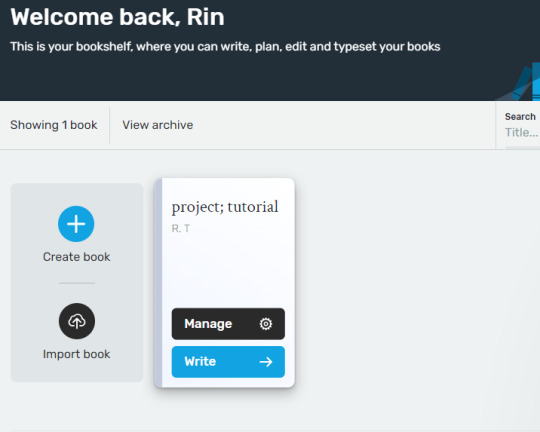
Once you click "Write," you'll be directed to the next page. There, you'll find your chapters, the space to write your manuscript, and a sidebar with various helpful features provided by Reedsy.
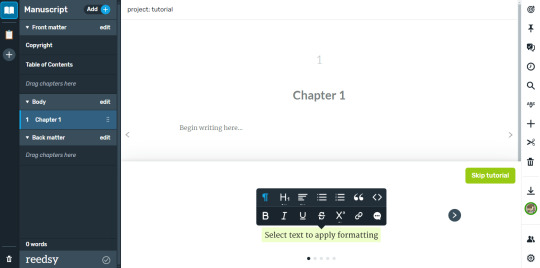
Then, you can choose any name for your chapter that feels meaningful to you.
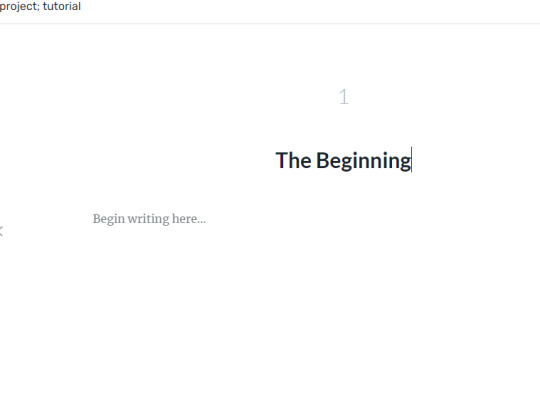
You can also track your writing goals for your specific manuscript or book. This feature provides insights into your writing habits, such as the days you've written and the number of words you've written. You can also set a target word count goal for the manuscript, and you also have the option to set manual writing goals. Additionally, you can check the word count in your current chapter from the bottom of the widget.
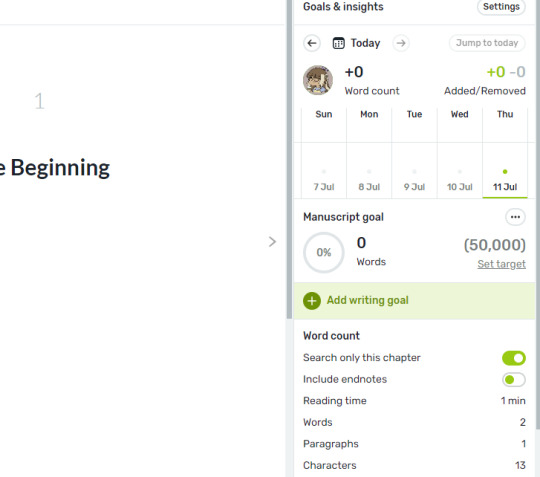
You have the option to set a deadline and choose the days that work best for you to write. This will help Reedsy estimate a realistic word count goal for you.
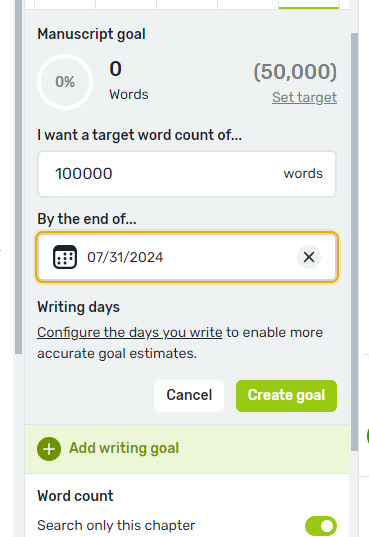
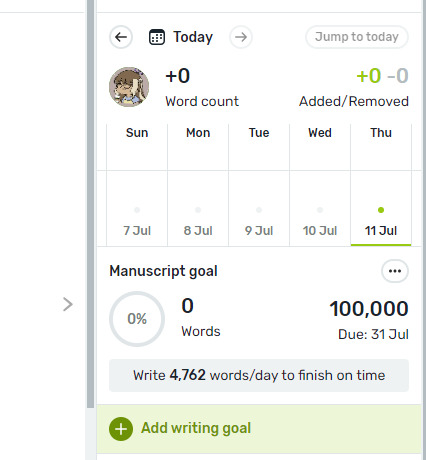
Remember that on Reedsy, there's a new beta feature that allows you to plan and outline your novel without having to leave the website. It offers note cards for you to jot down the plot and scenes from your novel, which can serve as a helpful guide and provide a simple outline to support your writing process.
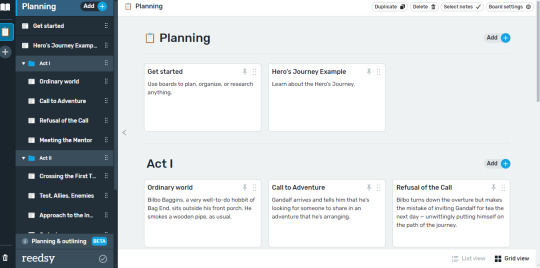
Also, don’t forget the various features available to you when creating your book in Reedsy. For instance, you have the option to include preset formatted pages such as a dedication page and an epigraph that resonates with your story. These features can add a lot of value to your book, and I encourage you to explore them further.
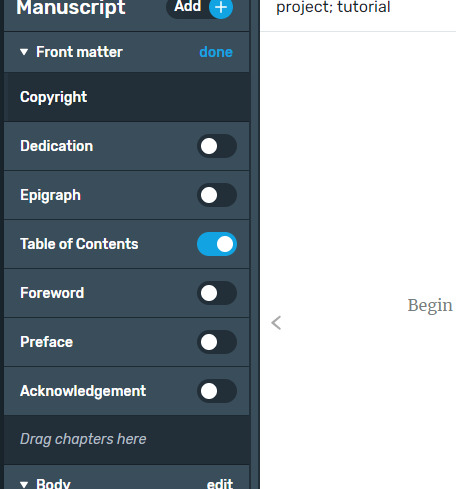
Hopefully this can help you understand the basics of Reedsy Book Editor. One of my favorite writing softwares that is completely FREE!
Hey fellow writers! I'm super excited to share that I've launched a Tumblr community. I'm inviting all of you to join my community. All you have to do is fill out this Google form, and I'll personally send you an invitation to join the Write Right Society on Tumblr! Can't wait to see your posts!
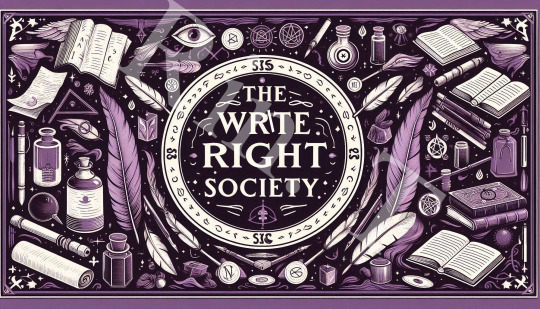
#writeblr#creative writing#thewriteadviceforwriters#writers on tumblr#writer things#writing#writing tips#on writing#writer#writer community#writing tools#writing resources#writing blog#writing advice#fiction writing#novel writing#author#book writing#publishing#indie author#fiction#reedsy#book editor#bookblr#self concept#bookworm#bookstore#books and reading#reading#book quotes
184 notes
·
View notes
Text
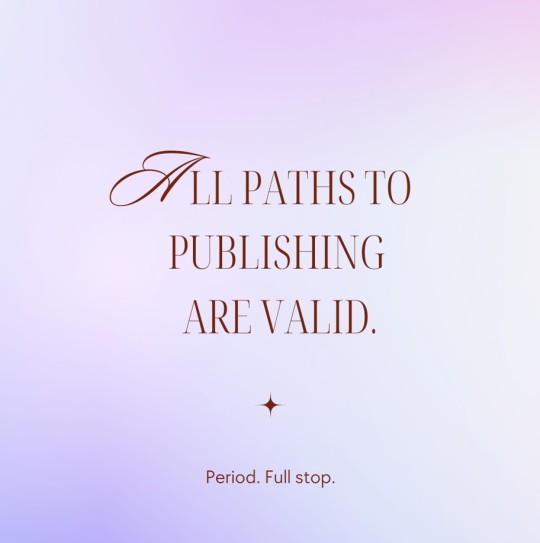
Just a quick reminder that I will not tolerate bad-mouthing of traditional, indie, hybrid, online, fan-fiction, or any other type of writing and publishing on my blog, in asks, in the replies, or in the reblogs.
Furthermore, anyone who feels the need to disparage any type of writing or publication should take some time to educate themselves and do some self-reflection. What insecurities are these feelings masking? Why are they not confident enough in their own writing or path to publishing to be supportive of all types of writing and publishing? Why do they feel the experiences of some are enough to invalidate the experiences of many?
There is room for everyone in the world of writing and publishing. There's no reason not to be inclusive of everyone, all types of writing, all paths of publishing, and advice from every background and level of experience.
~ with love, WQA
#writing#writing advice#publishing#self publishing#indie publishing#indie authors#indie books#writing tips#writing community#writers of tumblr#writeblr#writing help#snobs need not apply
316 notes
·
View notes
Note
I'm self-publishing but have no idea how to format my book. Any tips?
Absolutely!
If you'd like a deep dive into book formatting and what you need to know, we've got a whole post dedicated to it in the Reading Room at the link below.
#self publishing#writers of tumblr#writeblr#writing community#publishing#writers#creative writing#writing#creative writers#writing inspiration#writerblr#writing tips#writer#writing advice#writing resources#writers on tumblr
77 notes
·
View notes
Quote
Words are the writer's sorcery, our dark arts and our sleight of hand. They're our enchantment and our temptation
Karl Wiggins, Self-Publishing In the Eye of the Storm
#quotes#Karl Wiggins#Self-Publishing In the Eye of the Storm#thepersonalwords#literature#life quotes#prose#lit#spilled ink#words-of-wisdom#writing#writing-advice#writing-books#writing-craft#writing-from-the-heart#writing-inspiration#writing-process#writing-quotes
33 notes
·
View notes
Text
How much should it cost to be a writer?
It depends what route you’re taking. If you are planning to go for traditional publishing, which looks like you finishing a manuscript and then querying agents who will then take your book to publishers, you should be paying for basically nothing. One exception would be if you decide to hire an editor to get a pass over your manuscript and/or query package before sending it off, but this is not required.
If you are in the process of trying to get your manuscript traditionally published, you may be approached by a “publisher” offering to publish your manuscript for a fee. THIS IS A SCAM! An author should never be paying for “publishing services.” Anyone asking you to pay for your own printing, marketing, etc. costs is taking advantage of you. These are called vanity publishers and they will not turn you a profit, help you attract readers, or provide you the prestige of being published.
Always check on Writer Beware - search for the name of the person or company. You can also just google that name along with the word “scam” or “reviews.” In general, don’t let yourself be blinded by dreams, or let yourself be convinced that something is a good idea because you really want it to be true. Never, ever, ever pay a publisher.
If you are going the self-publishing route, you will be paying for certain things, but none of those should be payment to be published. You are the publisher. Uploading your manuscript to Amazon or other marketplaces is free. However, you will be paying for things that a publisher typically pays for. This could include:
-Cover art - you could do this yourself, though this isn't recommended. A good cover is key to a book's success, so budget to purchase a pre-made book cover, or hire a professional cover artist.
To find pre-made book covers, you can just Google "premade book covers," or check one of these sites: BookCoverZone RockingBookCovers Beetiful
And here's a list of places to buy both custom and pre-made cover designs that's a good start. You can also check Reedsy and Etsy for people listing cover design services. If there is a self-pubbed author whose covers you love, try asking them what artist they use.
-Formatting - you could do this yourself using a formatting program like Atticus, or you could hire someone who does professional e-book formatting.
Here's an article on the turbo-DIY route. Here's a list of formatting programs you can use. To hire someone, you can simply search for book formatting services or look at places where people list such services for hire, like Reedsy, Fiverr, or certain Reddit boards.
-Ad campaigns - you may want to pay for ad campaigns on platforms like Meta or Amazon. More niche, author-specific platforms like BookBub, Book Funnel, or Book Sirens also come with certain costs.
-Author services - you may wish to hire an expert in things like marketing, blurb copy, social media metrics, newsletter management, etc. You can find information on that here.
Be aware that scam publishers might try to pitch themselves as "author services" - you should be paying someone to help you with specific aspects of your self publishing work, NOT paying to be published.
-Software and platforms - whether it's a subscription to Duotrope, a paid Scribophile account, access to pro Canva features, etc. you may decide to pay for tools that you will use to do your work well.
-Expert advice - some people offer courses, books, or other resources on how to do specific things like write a compelling blurb or run an effective ad campaign. You may notice that a lot of the links I shared here will include upsells from people doing exactly this!
Be very cautious about this, as most of these people claim that they make tons of money on their self published books, but really, they make their money selling this stuff to people like you. Always check out a person’s free resources first, and wait to invest in this sort of thing until you have a specific question you need answered or are trying to do a very particular thing that you need granular guidance on.
One thing you should NOT pay for is a review, feature, or interview. Self-published authors will be approached by a lot of scammers who claim that, for a nominal fee, they will share information about your book to their huge audiences. These are completely useless and a waste of money. Never spend money on this.
Always keep track of what you are spending on all of this. You may be able to deduct it from taxes you pay on your income from writing, and you will want to really understand what your profit margins look like.
68 notes
·
View notes
Text
One of my goals for the New Year is to compile the best of Sophie Choir - a near decade of my creative writing - into a physical book.
Two reasons for doing so:
1) Tumblr will not be around forever and I do not want to lose said decade of writing to the increasingly rapid deterioration of the digital landscape. I have tried and not been crazy about the functionality of Tumblr’s blog export feature. I want a separate personal Word doc of the entire contents of my blog as pure archive.
2) Beyond a pure archive, I want to actively reflect on and edit my writing into a curated collection I am proud of, that I can keep on my shelf and give to my loved ones as an important part of myself. This would be the physical book. I know my presence on Tumblr has waned significantly [ though I reblog art & writing frequently on my side blog @sophiechorus ]; perhaps this will tie a bow on my Tumblr poetry era - at the very least, it will be part of a year of reflection and self-analysis as I figure out how I’m going to move forward creatively. I may transition to keeping most of my future writing private for a chance of “real” publication one day.
Since I have technically already “published” all of this writing by posting it here on Tumblr.com, this retrospective book will be self-published. I plan to compile, edit, and design it myself and print it through Lulu.com, having some experience with the process already from my career as a professional graphic designer. I’m really looking forward to making it beautiful.
I have begun the laborious task of copy & pasting my posts into a Word doc. I probably should not have started at the very beginning of my blog, since the oldest posts are extremely painful to read. The nausea has already put me off this project for a week, haha. But I am determined and will not be stopped even by the ghastliest specters of my past! :)
Just thought I’d share a bit of what’s going on behind the scenes. I don’t expect much or any interest, but if anyone would like a copy of the final book, feel free to let me know. Probably won’t ask anything for it (it would be my honor to find a spot on someone’s bookshelf) but it all depends on how the production costs shake out. I will post an update once the book is ready.
Hope everyone is well and filled with the hope and invigorating spirit of the New Year 🕊️
#thoughts#self publishing#poetry#also if anyone has done something similar#id be interested to hear your experience / advice#love yall
29 notes
·
View notes
Text
Blog time! In my April post over on the Other Blog, I talk about the 80/20 rule, how it relates to writing, and why 100% should never be your goal. Perfection is a pipe dream, but that's okay, and there's Science! to explain why.
15 notes
·
View notes
Text
@shylilfox asked: I write a lot of short stories. They’re explicit. Some of the ones people have read told me I should publish a book. Are short stories worth publishing? If so, how would I go about it?
Short stories are definitely worth publishing. And short story collections can do pretty well in the market. (Personally, Stephen King’s countless short stories are what first made me consider becoming a writer.)
To accomplish this, there are a few routes.
1. Post some of them online and gauge the reaction. If they get traction, you can decide what to do with that momentum (see No. 2). If they don’t, it might be a sign some edits or rewrites are needed, which is still good information.
2. Submit to outlets that publish short stories. There are a ton out there and if you get a story or two or three published that way, you can then go out to book publishers with a pitch for a collection of those and your other stories. (This is also a good way to land an agent, by the way.)
3. Self-publish. Now, I know everyone loves this idea for their writing and I’m not against it. You can make sales with self-published books, it just requires more hustling than anyone usually expects. However, if your goal is simply to have a book of your short stories out in the world, this is a good way to make that happen fast and solely on your terms.
73 notes
·
View notes
Text

5 Stages Of Editing A Book - Desireé Duffy
Watch the video interview on YouTube here.
#writing#authors#book cover#writers on tumblr#writing a book#book review#booklr#writers on writing#novel writing#women writers#fiction writing#writing community#writers of tumblr#writer community#creative writing#self publishing#self publish#publishing#author life#writeblr#author#writerscommunity#writers stuff#writing advice#writing prompt#designing a book cover#how to publish a book#ISBN#books and reading#writer stuff
15 notes
·
View notes
Note
post/734733274896809984/do-you-ever-worry-your-own-writing-might-come-off that makes sense. i was asking because i'm afraid of accidentally writing misogyny myself and i kind of admire what you do
Hmm... I wish I had better advice to give you on this front, but honestly, the only thing I can tell you is to consider the perspective of your female characters.
Women are people. They have thoughts and feelings of their own, so like... just let them have their own arcs. A lot of the worst misogyny in WC comes from the way that the writers just don't care about their girls (or, in the case of tall shadow, actually get undermined and forced to rewrite entire chapters), so they're not curious about their lives, or WHY they feel the way they do or what they want, or any direction for their character arcs.
Turtle Tail as an example. She'll often just end up feeling whatever Gray Wing's plot demands. She's gotta leave when Storm dumps him to make him feel lonely. She shows up again to love him in the next book. Lets her best friend Bumble get dragged back to Tom the Wifebeater, but is sad enough about her death to be "unreasonably angry" with Clear Sky, and then calms down and accept Gray Wing is right all along.
And then she dies, so he can have his very own fridge wife.
In this way, Turtle Tail's just being used to tell Gray Wing's story. They're not interested in why she would turn on Bumble, or god forbid any lingering negative feelings for how she didn't help her, or even resentment towards Clear Sky for killing her or Gray Wing for jumping to his defense. She isn't really going through her own character arc.
She does have personality traits of her own, don't misunderstand my criticism, but as a character she revolves around Gray Wing.
So, zoom out every now and then, and just ask yourself; "Whose story is being told by what I wrote? Do my female characters have goals, wants, and agency, or are they just supporting men? How do their choices impact the narrative?"
But that's already kinda assuming that you already have characters like Turtle Tail who DO have personalities and potential of their own. Here's some super simple and practical advice that helped me;
Tally the genders in your cast. How many are boys, how many are girls, how many are others?
And take stock of how many of those characters are just in the supporting cast, and compare that to the amount you have in the main cast.
If you have a significant imbalance, ESPECIALLY in the main cast, fire the Woman Beam.
It's a really simple trick to just write a male character, and then change its gender while keeping it the same. I promise women are really not fundamentally different from men lmao. You can consider how your in-universe gender roles affect them later, if you'd like, but when you're just starting to wean yourself off a "boy bias" this trick works like a charm.
Also you're not allowed to change the body type of any girl you Woman Beam because I said so. PLEASE allow your girls to have muscles, or be fat, or be old, or have lots of scars. Do NOT do what a cowardly Triple A studio does, where the women all have the same cute or sexy face and curvy body while they're standing next to dwarves, robots, and a gorilla.
Or this shit,
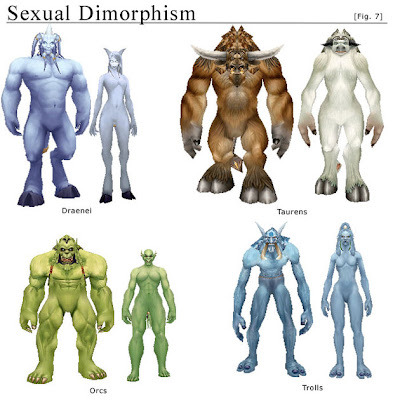
If you do this I will GET you. If you're ever possessed by the dark urge, you will see my face appear in the clouds like Mufasa himself to guide you away from the path of evil.
Anyway, you get better at just making characters girls to begin with as time goes on and you practice it. It's really not as big of a deal as your brain might think it is.
Take a legitimate interest in female characters and try not to disproportionately hit them with parental/romance plots as opposed to the male cast, and you'll be fine. Don't think of them as "SPECIAL WOMEN CHARACTERS" just make a character and then let her be a girl, occasionally checking your tally and doing some critical thinking about their use in the story.
(Also remember I'm not a professional or anything, I'm just trying to give advice)
#I wish I had more succinct and practical advice to give you besides the woman beam trick#Honestly I just kinda feel it out because I like telling stories about girls#I made it fun for myself by clapping and cheering and whooping and hollering whenever a girl does something#because it's not fun to write like a monk in a monastery#With the spectre of Brother Smockbimble looming over your shoulder telling you to Write Perfectly Every Time#Characters aren't real people. You can just fix it if you happen to fuck up or do better next time with what you learned.#Making mistakes is just part of acquiring skill#and writing is an art just like painting or drawing.#So don't make a fun OC project into homework! You should be enjoying making your own art! Express yourself!#Please understand that when I'm ripping into the series I'm being so harsh because it's bestselling corporate media#Read by HUNDREDS of thousands of kids worldwide#Raking in millions of dollars a year. Written by a TEAM of professionals.#So I have higher expectations of it than of a fandom rando on the internet. Or even a self-published author who's just One Guy.#Hence why I'm infinitely more charitable to Ratha than I am to Battle Cats#bones gives advice
119 notes
·
View notes
Text

Hey writers! 📚✨ Welcome back to Manuscript Monday, where I answer your burning questions about writing and self-publishing. Today’s question is one we’ve all faced: ‘Do you have any advice on writer’s block?’
Absolutely! Here are my personal tips to break through that block:
Set a Writing Schedule: Consistency is key. Even if it’s just 10 minutes a day, setting aside dedicated time can help you push through those tough spots.
Write with Friends (Body Double): Writing with someone else can boost your motivation. It’s like having a workout buddy—except you’re flexing your creative muscles!
Listen to Your Characters: If you’re stuck, focus on your characters. Ask yourself, ‘What would my characters do in this situation?’ Character-driven stories often work best, so let your characters guide the plot.
Character Generata/Questionnaires: These tools can help flesh out your characters and give you new insights, which might just be the key to pushing through writer’s block.
So, if you’re feeling stuck, give these tips a try and see if they help you find your flow again!
Happy writing, and remember—your story is worth telling! ✨📝
#publishing#self publishing#writing#authors of tumblr#writer's block#how to#writing tips#writing advice#writing resources#writing help#on writing#how to write
26 notes
·
View notes
Text
On self-publishing, and why I did it
Based on the research that I have done, following other indie authors across multiple platforms, I think I've made an approach to this that is a lot less... shall we say, *intense* than people make it out to be? I've seen some YouTube videos acting like picking one route or the other might be the worst mistake of your author career.
I mean, I guess?
Back a few years ago I had a manuscript I was querying around and couldn't find any takers. Couldn't find any publishing houses that were accepting open submissions to pick up my manuscript either. So many of them had clauses in the application verifying that you were submitting to them and only to them and to expect a reply within 8-10 months. Coooool.
I did not have time for that.
—
The manuscript I had was 120k words. Baby’s first novel sitting at 120k words is not attractive to publishing houses. It’s a risk. I was younger and didn’t know much about finding an agent and all that jazz, so I had looked into self-publishing and was staring down an editor bill of about $3k minimum because of my word count. I did not have the money for that.
So that manuscript got shelved, meanwhile I wrote the sequel and got halfway through book 3 before writer’s block took hold.
Enter February 2024. I have an idea for a new book. 31 days later, I have that book’s first draft done—Eternal Night of the Northern Sky, on sale from draft to publication in seven months.
This time, I didn’t consider for one second trying the traditionally published route. ENNS is 111k words, it’s a doorstopper of a book, but the bulk wasn’t the only reason I decided to bootstrap myself to the finish line.
I wanted complete, absolute creative control every step of the way
If I have to market myself anyway, why am I splitting profit with a publishing house?
I *really* don’t have time to wait around hoping the right person sees my manuscript. I have a new job coming that’s going to eat up all my free time and could either delay ENNS a year or more, or get it out while I still had time to do so
I didn’t do this for money
I think that’s what makes so many of those rather intense arguments for one or the other so harrowing—the pressure is a lot higher if you invested all this time, money, and effort expecting returns to break even, if not actually turn a profit. Publishing with a publisher doesn’t guarantee people will buy your book, mind you, but it’s a helping hand nonetheless. If I even want to break even, let's say just on royalties from the ebook, I'd have to sell over a thousand copies.
Breaking down my above points:
I’m a firm believer in “if you want something done right, you do it yourself,” which does bite me in the ass from time to time, this I know. I didn’t want to get caught up in contracts or editors telling me what I could and couldn’t do or what I had to change. If ENNS fails, I will have no one to blame but myself, and I am at peace with this. If ENNS fails, and I’d gone through the trouble of signing my book’s soul away to a publisher, then I’d probably be a little resentful. 100% of ENNS is mine, even the cover. I had an image in my head of what I wanted the cover to look like, and I sat down and I drew it and it matches perfectly. Aside from the feedback implemented from betas and editors, my story is told the way I wanted to tell it. If it fails, I am at peace with this.
On marketing, I am not a person who does well with social media. Maybe it’s autism, idk, but trying to keep up with an Instagram is exhausting. I just don’t get anything from tiny text posts and blurbs and doomscrolling through influencers and advertisements. Social Media is, for me, exhausting. Tumblr is different, because writing is my strong point and this blog exists to share and curate something useful. But either way, I’d have to market this book alone, so why not do so with full creative control? If it fails, I am at peace with this.
I have a new job coming very quickly. My current job allows me about 5 hours of free time during my 8 hour shift on a good day not including the time outside work, and I work from home. ENNS was written in 31 days thanks to this job. The new one? Not so much. Seeing “please allow 8-10 months” and “please ensure this is an exclusive submission” on so many little publishing houses, and I did search far and wide, was incredibly disheartening. For me, personally, it wasn’t worth the gamble of waiting all that time, following the rules, and being told no or just being flat-out ghosted. Nor did I want to sit around querying agents into the void. This time, I didn’t have time to sift through agents. ENNS had to get out on the shelves as quickly as I could get it, and all that time (five goddamn months of editing, 500% of the time it took to write it) was spent perfecting the manuscript that it is, *not* waiting around trying to find an agent. If it fails, I am at peace with this.
And lastly, I don’t care if I make absolutely nothing from this book. I didn’t do it for the money, I did it to say I could. I have a day job, and I’m about to have a much higher paying day job. Maybe I’m lucky enough to have that, but I am under no illusions that putting in the hard work guarantees success. Success as an author is a crapshoot and being an amazing book is not the metric sales are measured in, if no one wants to read it. I’d like to make money, I didn’t do it for charity. It’s going to be priced exactly the same as another fantasy book of its caliber. But if only one person buys it, and finds something good from it, something in it that changes their life, then I will have succeeded, profit be damned. If all else fails, I am at peace with this.
—
This is not a post meant to sway people one way or the other. I know I didn’t do enough research or scour the internet hard enough to find a good agent. All of this is irrelevant when time was the most important factor in my debut novel. I was in a position where I could drop that $3k on an editor, so I did. I’m a capable enough artist to draw my own cover, so I did. I might be abysmal at managing social accounts, but less than a year ago this blog didn’t exist and it has over 5k reblogs and 950 followers and I think that’s pretty swell.
I’m 25 years old. I was not about to let it keep sitting around waiting for the golden opportunity with the perfect publishing house that might not have been coming. I had the means and motive to get it done, and by god, I did it.
If it fails, at least I can say that I failed trying. I am at peace with this.
—
Eternal Night of the Northern Sky is available now on Amazon in ebook and paperback! It is also available through your local bookstore.
Check it out on Goodreads!
#writing#writing a book#writeblr#writing advice#writing resources#writing tools#writing tips#self publishing#self publication#indie author#publishing#Eternal Night of the Northern Sky
22 notes
·
View notes
Text
ima say something controversial but not brave. the problem with writing around tropes is a lack of payoff. for example, the one bed happens because of the plot itself and the bonus is building the romantic subplot tension. the story does not revolve around trying to reach the tropes. tropes are the filler, they are the spaces between the major beats which deepen the whole tapestry.
#lenee is yapping#on writing#creative writing#writing#writing advice#writing process#The current trend in publishing with marketing and writing everything around tropes misses the point of why the tropes exist and get people#Excited#like#the media these tropes originated with only had them sprinkled throughout as a device to help get#the relationships to certain points#but the wider overarching plot takes the forefront#when ur focused on how many self indulgent tropes and dynamics you can sell#you’re not making something substantial#it’s the writing equivalent of filling up on candy and not having any dinner
11 notes
·
View notes